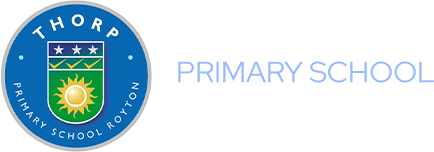Religious Education
Intent
The purpose of RE at Thorp Primary School is to provide children with knowledge that allows them to understand and explore beliefs, religions and non-religious views of people in our local area and around the world. In doing so this will begin to develop their own sense of identity and belonging. The knowledge the children learn at Thorp should also develop respect and understanding for people whose faith and beliefs may be different from their own. RE should prepare children for life as a citizen in a global society so we aim to prepare children to leave with the ability to understand and handle questions raised by religion, reflect upon their own ideas and ways of living and demonstrate tolerance towards others. Finally, RE should develop pupil’s skills in enquiry and response through the use of effective questioning and empathy.
Implementation
As a school we follow the Oldham Agreed Syllabus for teaching RE. During each Key Stage pupils are taught knowledge, skills and understanding through learning about Christians, Muslims, Hindus, Jewish and Humanist people under three headings ‘making sense of beliefs’, understanding the impact’ and ‘making connections.
Each unit of work identifies prior learning and shows how this is built upon. RE is taught in a block unit within a term to allow suitable links to be made to specific religious festivals taking place.
This scheme shows a realistic picture of religion and beliefs within our school, within the local Thorp community and within the wider Greater Manchester area.
Lessons are planned and delivered in a variety of ways ensuring that all children can access and participate in lessons along with opportunities to visit places of worship.
Impact
Children will make at least good progress from their last point of statutory assessment or from their starting point in Nursery.
As children progress throughout school, they develop a deep knowledge, understanding and appreciation of their local area, its people and religious beliefs.
We measure the impact of our curriculum through the following methods;
- Learning walks and professional dialogue with teachers.
- Accessing children’s understanding of vocabulary before and after the ‘knowledge and skills’ have been taught.
- Activating prior knowledge at the start of each topic through the use of flashbacks
- Images, Quotes and a selection of the children’s written/practical learning are documented in class floor books.
- Interviewing children about their learning (pupil voice).
- Moderation/staff meetings where class floor books are scrutinised and there is an opportunity for dialogue between teachers to discuss the learning and teaching in their class.
If you have any questions about our curriculum or are considering withdrawing your child from specific lessons. Please contact the school and the RE leader will be happy to meet with you about your concerns.
Progression Documents
-
RE Curriculum Progression
download_for_offline
download_for_offlineRE Curriculum Progression
Curriculum Road Map
Knowledge Organisers
Year 1
Year 2
Year 3
Year 4
Year 5
Year 6

OUR SOCIAL WALL